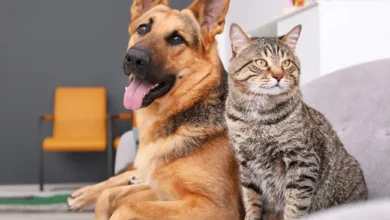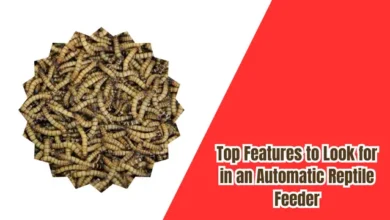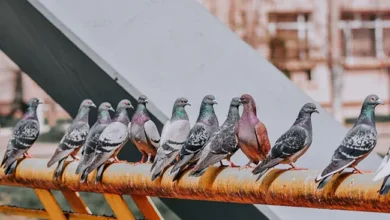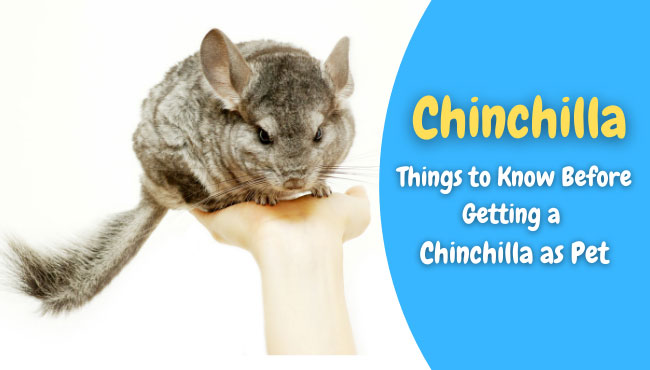
Chinchillas are quickly becoming a popular pet choice, but before you decide to add one of these furry creatures to your family, there are a few things you should know. In this article, we will discuss six important points that will help you make the right decision about whether or not a chinchilla is a right pet for you. We’ll also provide some tips on how to care for your new friend once you bring him or her home. So, if you’re thinking about getting a chinchilla, read on!

Read More:
- 6 Pets You Can Keep in Your College Dorm
- 6 Dog Care Tips For Busy Owners
- The Ultimate Guide to Train Your Dog to Get Along with Your Bird
- Can Dogs Be Allergic to Their Beds?
- How to Make Your Bird Happy: Useful Pieces Of Advice
What Is A Chinchilla?
Chinchillas are native to the Andes mountains in South America and are related to guinea pigs, rabbits, and porcupines. It is a popular pet that comes in a variety of colors, but the most common are gray or white. They have thick fur coats that help protect them from the cold weather in their natural habitat. The best way to describe a chinchilla’s fur is soft and silky. These furry friends can live up to 20 years in captivity, so they are a commitment!
1. Handling Your Chinchilla
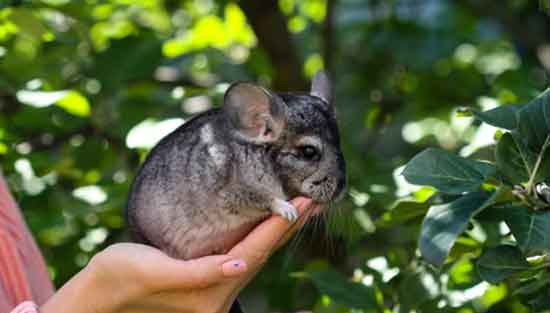
When it comes to handling your chinchilla, it’s important to be gentle. Chinchillas are delicate creatures, and they can easily get injured. When picking up your chinchilla, support their back and bottom so that they feel secure. Namely, every chinchilla noise means something, and you should watch out for them. For example, a soft purring noise means that your chinchilla is content, while a loud squeal means that they are in pain. In addition, you should never hold your chinchilla by the tail as this can cause their skin to tear. If you need to move your chinchilla from one place to another, it’s best to use a carrier. This will help to keep them safe and secure.
2. Chinchillas Are Herbivores
Chinchillas are herbivores, and their diet consists mostly of hay, fresh vegetables, and a small number of pellets. They also like to chew on wood to keep their teeth healthy. It’s important to make sure that your chinchilla has access to hay at all times, as it is essential for their digestion.
Vegetables that are safe for chinchillas include:
- dark, leafy greens like kale and spinach
- root vegetables like carrots and parsnips
- squash and pumpkin
- green beans
Fruits should be given sparingly as they are high in sugar and can cause digestive issues. Namely, avoid feeding your chinchilla citrus fruits, bananas, grapes, and raisins. On the other hand, some common signs that your chinchilla is not getting the right nutrients to include soft or thin fur with bald spots, lethargy, and diarrhea. If you notice any of these signs, take your chinchilla to the veterinarian for a check-up.
3. Chinchillas Need Access To Fresh Food And Water
As we mentioned, chinchillas need hay, fresh vegetables, and a small number of pellets. It’s important to have a water bottle for your chinchilla as they need to drink fresh water every day. The water bottle should be attached to the side of the cage so that it is easily accessible.
You should also clean the food and water dishes every day to prevent bacteria from growing. Chinchillas are very clean creatures and they will not drink from a dirty water bottle or eat from a dirty food dish. In addition, you should clean the cage at least once a week. This helps to prevent your chinchilla from getting sick and it also makes the cage more comfortable for them to live in.
4. Cages For Chinchillas
Chinchillas need a large cage that is at least 24 inches by 24 inches. The cage should be made of wire so that the chinchilla can climb and jump around. It’s also important to have a solid bottom in the cage as chinchillas like to dig. In addition, the cage should also have a few different levels so that the chinchilla can explore and exercise. You can create different levels by using platforms, ramps, or branches. It’s important to note that chinchillas are escape artists, so the cage needs to be secure.
In addition to the main cage, you will also need a smaller cage for when you are cleaning the main cage. This is because chinchillas should not be exposed to cleaning chemicals or other harmful substances. When you are cleaning the main cage, simply put your chinchilla in the smaller cage and put it in a safe place until the cleaning is finished.
5. Giving Your Chinchilla A Bath
When it comes to giving your chinchilla a bath, there are a few things you should know. First of all, chinchillas hate getting wet so it’s important to only use water that is room temperature. Secondly, avoid using soap as it can dry out their fur and skin.
If you do need to use soap, make sure it is a gentle, unscented soap. Thirdly, only bathe your chinchilla for a few minutes, and be sure to rinse them off completely. After the bath, put your chinchilla in a towel and gently rub them dry. Once they are no longer wet, you can put them back in their cage.
Moreover, giving your chinchilla a dust bath is a much better option than using water. Dust baths help to remove oil and dirt from their fur and skin. To give your chinchilla a dust bath, simply fill a container with chinchilla dust and let your chinchilla roll around in it for a few minutes.
6. Chinchillas As Pets
Aside from being a popular pet, chinchillas are great for people who are looking for small, low-maintenance animals. They are also relatively easy to care for, as long as you know what they need. If you are considering getting a chinchilla, be sure to do your research so that you can provide them with a happy and healthy home. You’ll also need to have a large cage and some patience when handling them. But if you’re willing to put in the time and effort, a chinchilla can make a great addition to your family.
To conclude, getting a chinchilla as a pet requires some level of commitment but if you are willing to put in the time and effort, it can be a rewarding experience. Chinchillas are low-maintenance pets that are relatively easy to care for. They also make great companions for people who are looking for small animals. If you are considering getting a chinchilla, be sure to do your research and provide them with a happy and healthy home.

